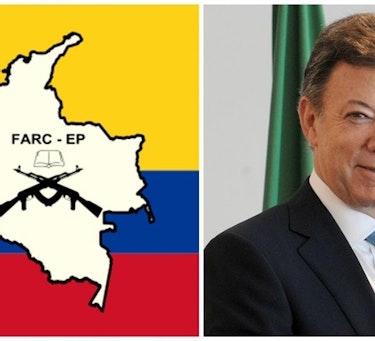#paxit – Colombia’s refusal of the peace agreement

To the left: the FARC flag. To the right: President of Colombia and Nobel Peace Prize winner 2016, Juan Manuel Santos.
Foto: Public domain (left) and Agência Brasil (right) CC 3.0.This week’s analysis is written by Neving Rudskjær who is a political officer at the OSCE in Tajikistan, and alumni of the Norwegian Atlantic Committee. Mr. Rudskjær writes on a very timely topic in regards to the annunciation by the Norwegian Nobel Committee - namely the peace process in Colombia. He recommends three sources for further reading on the topic. Enjoy the reading!
For many this week’s saddest piece of news was the result of the referendum in Colombia over the proposed peace deal between the government and the Fuerzas Armadas Revolucionarias de Colombia (FARC) guerrilla. The peace talks had been going on since August 2012, and the talks lead to a ceasefire, in place since June this year and finally an agreement on the terms for lasting peace. This process seemed from the outside to be a success-story that would finally deliver peace to Colombia after over fifty years of conflict. But as recent history shows us, referenda don’t always yield the expected outcome.
On 2 October, by a marginal majority (by 50.2% to 49.8%), the peace deal was rejected. In the recommended article, does Omar G. Encarnación present the main reasons for the rejection of the deal by the Colombian people. It also offers a description of the most likely way ahead. I’m recommending this article because it shows that the “no” doesn’t necessarily imply a re-emergence of violence in Colombia and that FARC, negotiating from a position of weakness, might be forced to make bigger concessions.
The opposition to the deal wasn’t rooted in an opposition to peace, but rather in a perception that the guerrilla had been given too much by the government. Encarnación ends on a positive note, stating that “the prospects for peace in Colombia are brightened by the maturity of Colombian democracy”, as the referendum took place without fraud or violence. There’s still hope for peace.
Recommended reading:
Foreign Affairs, Colombia's Failed Peace
Further reading:
The International Crisis Group, Reassembling Colombia's Rejected Peace Deal
NPR, Guess What? As Of Today, The Western Hemisphere Has No Wars
Neving Rudskjær is a political officer at the OSCE in Tajikistan and alumni of the Norwegian Atlantic Committee.